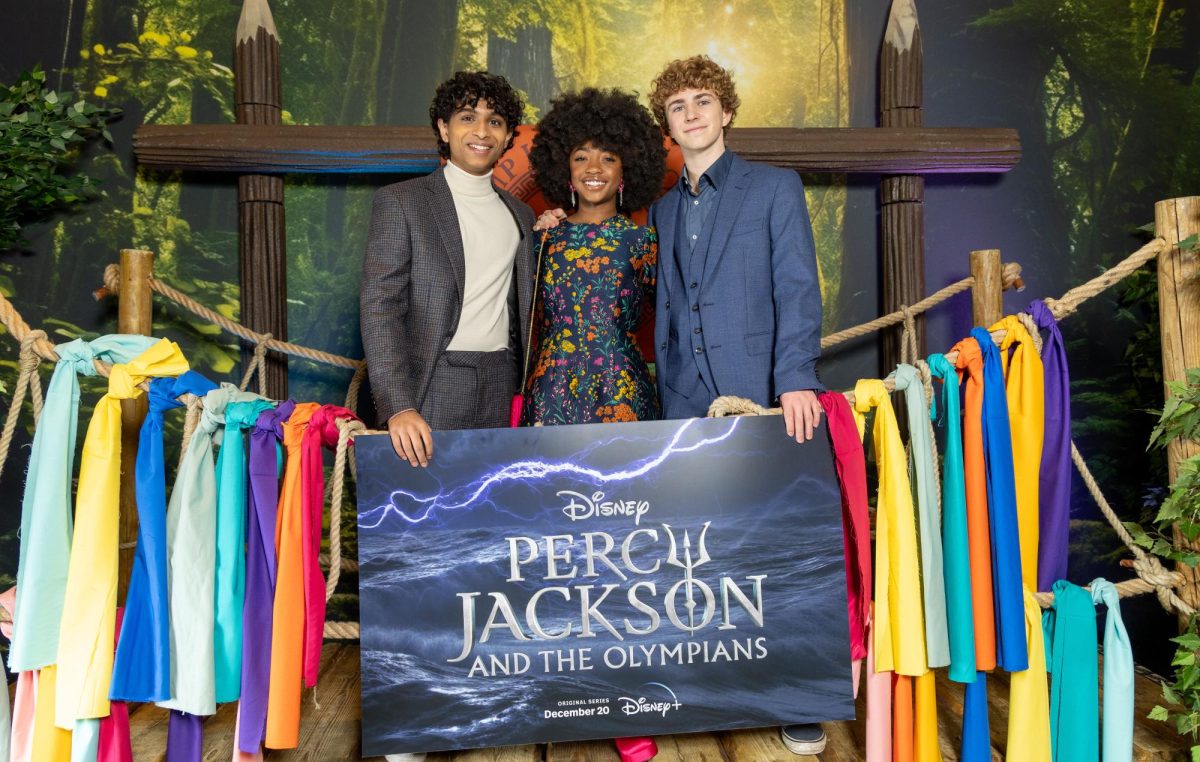For Percy Jackson fans, a TV Show adaptation was a dream come true. After the badly adapted and badly rated film, featuring aged-up characters and inaccurate events, fans eagerly awaited the release of the show’s first two episodes on December 19, 2023, to see if this iteration could succeed in bringing the sarcastic, brave, and funny title character to the screen. Since then, episodes have been released every Tuesday at 9:00 PM EST on Disney+ with the last episode aired on January 30, 2024. The first season, modeled after the first book in the original series, The Lightning Thief, includes eight episodes named after some of the book’s chapter titles.
The show beautifully actualizes many of the book’s settings, exhibiting the creativity, humor, and subtext of the children’s novel; however, while it successfully delivers a more nuanced take on the book’s main themes, some of the casting, visuals, and plot changes deprive the show of the excitement that readers feel when they read the series for the first time.
The show’s take on Camp Half-Blood is right out of the reader’s mind. The creators took pains to stay true to the book’s imagery with the organization of the cabins, satyr strawberry fields, and the inclusion of other camp buildings like the Pegasus stables, forge, and outdoor shooting range. Removing the arena and depicting kids practicing swordplay in the fields leaned into the summer camp feel.

Other sets, such as the Gateway Arch and Auntie Em’s Emporium, stay true to the books with minor changes and help satisfy the reader’s imagination; however, the Underworld, which looks more like a foggy desert at night, lacks foreboding and instead feels unnecessarily child-proofed and consequently underwhelming. The show depicts the Fields of Asphodel as a forest of souls slowly turning into trees—a rendition of Hell that is not nearly as haunting or eerie as Greek mythology’s (and the book’s) actual fields. Additionally, a landscape of black rock, soot, and the famous Underworld rivers (one of which runs fire) rather than a foggy desert would better indicate the weight of the main trio’s fate; they are sneaking into a land that no one escapes in mythology. The Underworld should reflect the fear and dread implied here. Additionally, Hades’ palace, which is built inverted out of the sky, seems derived from the Upside Down in Stranger Things but lacks the Netflix show’s sinister and chilling qualities. A more traditional castle with torches and imposing obsidian—something akin to how the Hades cabin looks in later books—is not all that scary for the viewers and would better suit Hades.
The show is also child-proofed in the length of the episodes and fight scenes. The longest episode is 44 minutes, but the shortest is a mere 33. The short episodes feel like unused time—time showrunners could have spent developing the fight scenes. Simply put, the action ends before it begins. This may be because Disney wishes to avoid intense or violent scenes, yet kids watch a lot of media that is at least marginally more intense or violent than this show. Action is cool, enticing, and fun to watch. Without it, the show drags. Besides, action sequences in the book itself are more detailed than the show’s display. Given that reader viewers desperately want to see the details actualized, I hope that in later seasons, the showrunners elaborate on these scenes.
The show’s realization of the book’s iconic humor fortunately does not disappoint. While Walker Scobell’s Percy Jackson is calmer and more pensive than the book counterpart, his one-liners and overall skepticism regarding the new world he has discovered aligns well with the written series. Scenes like Capture the Flag (Episode 2) and taxi-driving (Episode 6) show Percy’s inherent light-heartedness and sarcasm.
The show tackles the fun aspect of the book but also takes a more nuanced interpretation of the gods’ central flaws: their pride and neglect of their children. They use Medusa’s story to parallel Annabeth’s flimsy relationship with her mother. Additionally, Percy’s more pronounced renouncing of the gods when he voices his alliance with Annabeth over his father emphasizes the overall conflict of the book. It is extremely difficult to have an absent or irresponsible parent—especially one that, in the context of Percy Jackson, places you in direct harm while explicitly denying any protection. Throughout the written series, this issue causes Luke to bitterly oppose the Olympians, a position that is justified. The show’s accentuation of the messed up child-parent relationship is a skilled set-up for the eventual betrayal that culminates in the first season. One cannot help but notice, though, that the show depicts Poseidon, Hephaestus, and Hermes as parents who at the very least care for demigods while depicting Athena as a heartless monster willing to kill her daughter for impertinence—the balance of blame between gods is off-kilter.

The casting and characterization are at times fantastic and otherwise disappointing. Walker Scobell brings all the dryness and intensity of Percy. Leah Sava Jeffries’ Annabeth is piercing and quick-thinking, if quite uninhibited. Admittedly, their relationship with each other is less characterized by snark and annoyance than I had hoped. The show toes the line of understanding that this friendship (and eventual relationship) currently exists between two tweens, featuring nearly too much foreshadowing regarding the future couple. It may be sacrificing the arc of their relationship for the sake of including Percabeth moments now; these kids annoy each other and get in the other’s way but ultimately grudgingly like each other. I am sure viewers would be satisfied with scenes that properly reflect this. This being said, the Percabeth rapport hits well, such as when Percy comments on their shared hug. Many other characters, including Grover Underwood (Aryan Simhadri), Clarisse La Rue (Dior Goodjohn), Luke Castellan (Charlie Bushnell), and Hermes (Lin-Manuel Miranda) were beautifully portrayed. I look forward to seeing the complexity of these characters grow as they get more show time in later seasons.
I am less satisfied by the portrayal of some other characters, such as Chiron, Hades, and Charon. Chiron lacks the age-old resignation and dry humor of the thousands-year-old centaur in the books. Hades, perhaps the only deity that projects the severity of his occupation in the books, comes off as comedic and not nearly visually striking enough to imply his power. Charon, the Underworld’s ferryman, should be a childish employee who wants a raise and loves Italian suits but is instead a creepy, white-faced, hooded spirit. Percy Jackson’s charm lies in that it humorously adapts the Ancient Greek world. Charon’s characterization only takes from that.
Similar to this, the show deprives most situations of their suspense by making the main trio aware of the situation they are walking into. At the Lotus Casino, they know not to eat the flowers. At Crusty’s Water Bed Palace, they know how Procrustes kills travelers. Half the excitement of the book and the show lies in the viewer not knowing what is happening…which means that the characters should not know either so viewers can learn as the characters grasp solutions in the moment.
This causes two main issues. First, difficult situations display character—because these characters walk into every situation knowing how to walk out, they do not get a chance to show us who they are. We do not see Annabeth’s quick thinking because every solution is pre-planned, nor do we see Percy’s courage when walking into spontaneous battle, nor Grover’s loyalty when he swoops in with a ridiculous but endearing stunt to save his friends. Second, pre-empting all the solutions, especially for a troupe of 12-year-olds, is not as realistic as it seems. Not only are suspense and excitement necessary elements in an action show but also, it is very difficult to connect situations you actively exist into ones you have heard of in the past; people are just more inclined to think their predicament is unique. When you combine this fact with the minds of scared, exhausted 12-year-olds, it is not at all surprising that they walk into mythical situations without realizing it. So, it makes little sense that these kids know the solutions beforehand given that people, especially children, just don’t think like that.
Similar to this, the show let quite a few small details fall through the cracks. These details, while not crucial to the plot or characters, are what polish the show. At times, obvious discrepancies unnecessarily divert attention from events in the episode. For example, in the first episode, Olivia Rodrigo’s “logical” plays over Sally Jackson standing on the balcony in the rain. Despite that it is intended to be timeless, this show inevitably feels like a 2010s phenomenon. Because of this, extremely modern tunes (Rodrigo’s song came out on an album just released in September, last year) simply feel out of place.
Another small missed detail: in “We Take a Zebra to Vegas,” the main trio does not, in fact, take a zebra to Vegas. They take an ostrich, not a zebra. Animating or including a zebra in this scene would not have been difficult given that other animals were animated, yet the showrunners neglected to do so. Additionally, in the same episode, the trio enters the Lotus Casino, where people over many decades get lost for many years—and consequently should be dressed like they are from different decades. The casino should also have arcade games from various times. In the episode, though, no extras looked out of time and all the games were modern and VR-related. Loyalty to the premise of the Casino would have been a nice touch, and the lack of it resulted in a visual plot hole.
While the above changes failed to improve the show, some changes made to the show did enhance it. Mainly, the flashbacks included to describe young Percy Jackon’s childhood with his mother, Sally, supplement the theme of parental and child struggle because of the Gods’ carelessness. Virginia Kull, who portrays Sally, expertly shows the mettle of this widely adored character as well as the emotional exertion that she embodies as a single mother of a child with learning difficulties and victim of harmful, unpreventable incidents. Getting to see these moments between her and Percy is an ode to single-parenting and an effective framework for how Percy will go on to perceive the Greek world. As Sally says in the show, “I want him to know who he is before your family tries to tell him who they want him to be,” and the person he becomes undoubtedly reflects her steely aspiration.
In almost all aspects—visualization, characterization, humor, and excitement—the Percy Jackson show is both a hit and a miss. Still, I am hopeful for future seasons because I want to continue seeing this quintessential childhood series come to life. While not perfect, it certainly has future potential to satisfy viewers. It’s worth the watch if you’re up for something that’s just a bit of fun.



